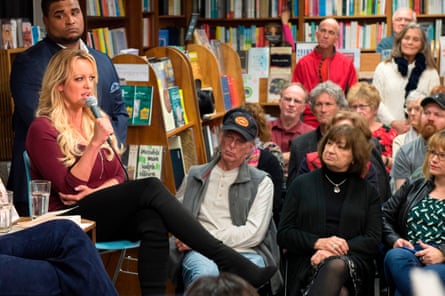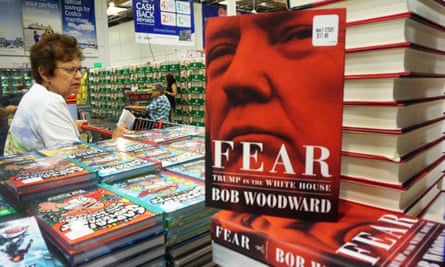“Fast away the old year passes,” the carol says. Some years, though, come to seem longer than others.
A review of books on US politics published this year requires more than the usual blowing of intellectual dust from volumes already seeming outdated. Consider that Michael Wolff’s Fire and Fury: Inside the Trump White House was a major story – broken by the Guardian – in January but is now largely forgotten, overtaken by events. A tell-all chiefly remembered for Steve Bannon’s harsh view of the June 2016 Trump Tower meeting with a Russian attorney, which led to his separation from “Trump World”, and the harsh criticism of Donald Trump it reports even from allies and friends, it now seems almost of antiquarian interest. The circus has moved on, and not happily. Too breathless in parts, Wolff’s book is nevertheless a good read.
Likewise, a series of books whose authors have left the administration seem little more than a staccato display of fireworks. As befits the analogy, most were duds that failed to ignite or hit the ground with a thud: one news cycle or two, then gone. In this category belong Anthony Scaramucci’s Trump: The Blue Collar President, which lasted in the public mind about as long as he did at the White House, and Sean Spicer’s The Briefing, an attempt to spin many failures, such as the rollout of the travel ban, as the result of simple inexperience or the fault of opponents. The former press secretary did at least give us the memorable description of Trump as “a unicorn, riding a unicorn over a rainbow”. Omarosa Manigault Newman’s Unhinged probably took the cake with its effort to both bear witness to power and settle scores.
There is a pattern in these books: ephemeral tales of crude vulgarity, petty personal (and personnel) squabbles and breathtaking bureaucratic dysfunction, with the occasional piercing insight thrown in almost as an afterthought.
From outside the administration, Howard Kurtz delivered a robust Trump defense in Media Madness and Stormy Daniels, in Full Disclosure, pulled no punches in her portraits of Trump and his former lawyer Michael Cohen. James Comey, the FBI director fired by Trump, offered A Higher Loyalty as his attempt to set the record straight.

From Trump’s own corner came Trump’s Enemies, in which Corey Lewandowski and David Bossie follow the pattern of their boss and attack while defending all Trump has done, to the point of terming his former campaign manager Paul Manafort a “rat”. The book offers a preview of what a Trump campaign might look like in 2020 and it is not elevating, offering ammunition for supporters without really addressing the many charges against him. It criticizes those who, like the White House chief of staff, John Kelly, or the National Economic Council head, Gary Cohn, have seemed the most moderate or reasonable administration figures. “Let Trump be Trump,” the authors opine, and all will be well.
Importantly, amid all this there was a Bob Woodward book: Fear. Under normal circumstances, such a work would be anticipated for months, with trepidation inside the administration as colleagues begin by wondering who has been talking to the hero of Watergate and then realize that most of them have. This year, even Fear seems to have left less of a mark on the popular mind than it warrants. If it changed few minds, that is because there were relatively few minds susceptible to being changed.
Fear is nevertheless an important book, clearly the best to summarize the troubles of the past two years. Woodward writes a serious, fact-based account of the Trump administration, with some key revelations – for example, the efforts of some Republicans to replace Trump as the nominee after the video of his boasts about sexual misconduct emerged. The result, as Woodward clearly intended, is sobering. Serious students of American politics should read it.
Most of these books, unsurprisingly, contain at least some references to Robert Mueller’s investigation of Russian election interference and links between Trump and Moscow. For a comprehensive treatment of Russian influence on the election, Cyberwar by Kathleen Hall Jamieson links the timing and use of the leaked emails to polling data, and concludes that it did determine the outcome. It remains to be seen how closely Mueller may follow her roadmap.
On similar themes, in Russian Roulette, Michael Isikoff and David Corn detail numerous connections, personal and professional, between Trump and Russia. Seth Hettena’s Trump/Russia: A Definitive History and Greg Miller’s The Apprentice cover much of the same ground, Miller focusing on technology and the 2016 election.
It is equally unsurprising that the year saw a number of jeremiads, chiefly from Republicans distressed about the state of their party and leader. David Frum’s Trumpocracy laments the decline of norms of governance and warns of creeping authoritarianism. In Everything Trump Touches Dies, the political consultant Rick Wilson offers a robust protest against Trump (“his nationalist hucksterism smelled like … a knock on the door of authoritarian statism”) while ultimately concluding that “we” – broadly, the political class – “fed the monster and trained it”. More analytically but perhaps equally alarmingly, Michael Lewis’s The Fifth Risk is a well-written and important study of Trump’s impact on the federal bureaucracy. Despite the subject matter, it’s surprisingly readable.

After the bitter loss of 2016, Democrats were not immune from introspection. Ben Bradlee Jr’s The Forgotten is a deep engagement with the voters of Luzerne county, Pennsylvania, in the heart of Trump country, seeking to explain the troubles of the white working class. From the right, Selena Zito and Brad Todd’s The Great Revolt is a strong analysis of populism and Trump’s base.
On the positive side, Senator Ben Sasse, of Nebraska, offers in Them a very different way forward for the Republican party. Drawing on a strong vision of community, Sasse seeks an America in which the two sides at least understand each other better and find instances of common purpose.
In August, America bid farewell to Senator John McCain. The Restless Wave, written as he was dying of cancer, is pure McCain: saucy and stern, with warnings about the future of democracy and external threats and a paean to the Senate as it was. McCain never lost sight of ideals, nor of hope. “We are citizens,” he wrote, “of a republic made of shared ideals forged in a new world to replace the tribal enmities that tormented the old one.” His conclusion: “I have loved my life. All of it.”
Michelle Obama has become a similar force in American life. The success of her memoir, Becoming, along with her prominent role supporting Democrats in the midterms, is a sign of her emergence as such. Spoiler alert: she has “no intention of running for office, ever”.
In 2019, as the departures continue from a White House noted for exceptionally quick turnover, we may expect more exposes, tell-alls and page-turners. Fortunately for those tiring of the rush, 2018 also saw publication of some strong works of political history. For a good holiday read, pick up David Blight’s magisterial Frederick Douglass or Nathaniel Philbrick’s In the Hurricane’s Eye. There will be politics enough to come.
